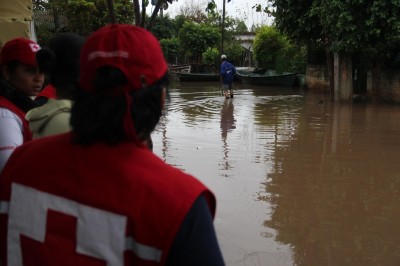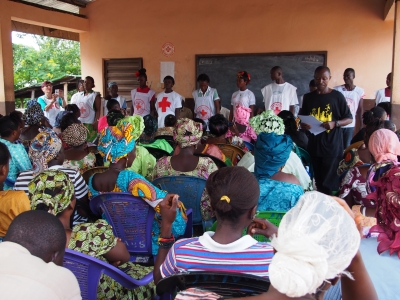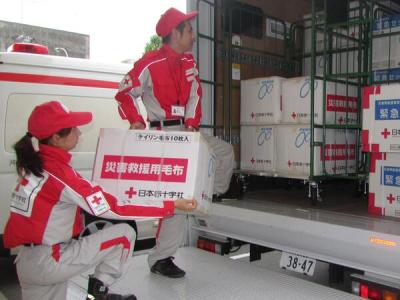On January 29th, an explosion caused extensive damage to the Cuajimalpa Maternal Hospital on the outskirts of Mexico City. The Mexican Red Cross has responded with 23 ambulances and more than 40 rescuers and is helping to transport victims to other hospitals. The Mexican Red Cross has not asked for additional assistance from the American Red Cross at this time. We continue to monitor the situation.
Disaster Alert: Typhoon Hagupit (Ruby) Approaches the Philippines
December 4, 2014Typhoon Hagupit (locally known as Ruby) has gained strength in the western Pacific and is projected to intensify further as it heads towards the Philippines. If the storm makes landfall, it will pose a serious threat to lives, homes and livelihoods. It is possible that it will cross through highly populated areas and affect millions of people—including the Visayas region which was hit by Typhoon Haiyan in November 2013. The typhoon could also also impact the Central Luzon and Mindanao regions of the country.
The Red Cross is taking emergency preparedness measures as the storm approaches. Philippine Red Cross disaster response teams and volunteers are ready to support evacuations in high-risk areas if necessary. Additional staff and volunteers across all areas are on high alert. In Tacloban, the local Red Cross is ready to provide first aid support and has pre-positioned teams throughout the city. Relief items such as food, sleeping mats and hygiene kits are being prepared. Emergency equipment—including water trucks, generators, chainsaws and communications gear—is ready for use in areas that may be impacted by the storm.
The global Red Cross network in the Philippines is ready to respond to the worst-case scenario and has pre-positioned supplies for up to 30,000 families in Manila, Cebu and Subic, including blankets, sleeping mats, bed sheets, jerry cans and mosquito nets.
Disaster Update: Mexican Red Cross Responds to Hurricane Odile
September 18, 2014More than 500 Red Cross volunteers are helping people affected by Hurricane Odile in the Mexican state of Baja California Sur. The volunteers—120 of which are paramedics—are providing basic medical check-ups and delivering food to people housed in shelters. The Red Cross has sent 2,000 food parcels to the city of Los Cabos. In addition, volunteers are carrying out damage assessments in Baja California Sur in order to determine the most urgent needs.
The storm has left roughly 82% of the population in Los Cabos and La Paz without electrical power, damaged roadways, and caused ports to close. People affected by the storm have evacuated to 164 shelters in Baja California Sur.
Mexican Red Cross volunteers participating in the response are specialists in collapsed structures, damage evaluations, pre-hospital care, and logistics support in shelters & collection centres. The Mexican Red Cross is working closely with federal authorities, Civil Protection, the Governors Secretariat, the Mexican Marines and Army, to deliver the aid to the people affected as quickly as possible.
Another storm—Hurricane Polo—is threatening the Mexican state of Guerrero, where at least 120 Mexican Red Cross volunteers are prepositioned to act if needed.
Disaster Update: Hurricane Odile in Mexico
September 16, 2014Hurricane Odile struck Mexico’s Baja peninsula on late Sunday evening. Now graded as a Tropical Storm, the system is still active and slowly moving up the peninsula.
Roughly 80% of the areas in Hurricane Odile’s path are without electricity and approximately 3,000 people have had to evacuate their homes, as of September 15. In response, 120 Mexican Red Cross paramedics are providing basic medical check-ups and delivering food to people housed in shelters.
Five municipalities on the peninsula have declared a state of emergency in response to the Category-3 storm. Airports and highways have been damaged and seaports have closed due to high winds. In Cabo San Lucas, approximately 15,000 national and international tourists have been stranded. Thus far there have been no reported storm related deaths, although roughly 100 minor injuries have been reported.
The Mexican Red Cross is working alongside the Mexican Army and Navy, as well as the government of Mexico’s Civil Protection Agency and the National Emergency Commission to determine the most urgent needs and assess the full extent of damage.
Disaster Update: West Africa Ebola Outbreak
July 31, 2014As the deadliest outbreak of Ebola in recorded history continues to devastate Western Africa, the American Red Cross is supporting efforts through both financial and staffing support.
While the Sierra Leone Red Cross is taking the lead in promoting awareness through social mobilization campaigns, the American Red Cross, along with the global Red Cross network, is helping amplify efforts and strengthen capacity. An American Red Cross specialist has been deployed to provide telecommunications support and internet to the health team in country, and follows another IT specialist that had been in Sierra Leone for the past month.
The American Red Cross has also assisted with remote mapping and information management in the region and has contributed $100,000 to strengthen the capacities of both the Liberia Red Cross and Guinea Red Cross. These funds will help manage the Ebola outbreak response and increase public awareness of the virus.
Red Cross volunteers in the region working to assist with Ebola awareness efforts. In total, more than 2,500 volunteers have been mobilized in Sierra Leone, Liberia and Guinea to date.
Since March 2014, some 1,200 cases have been reported and more than 670 deaths have been linked to the virus in Sierra Leone, Liberia, Guinea and most recently, Nigeria.
Currently outbreaks are centered in the cities of Kailahun and Kenema in Sierra Leone, and the counties of Lofa and Montserrado in Liberia.
Recognizing the severity of the issue, Liberian President Ellen Johnson Sirleaf has announced the closure of most of Liberia’s borders, with stringent medical checks being stepped up at airports and major trade routes. The government has also banned public gatherings of any kind, including events and demonstrations.
Difficulties remain in identifying cases, tracing contacts, and raising public awareness about the disease and how to reduce the risk of transmission. These difficulties, including widespread misconception, resistance, denial and occasional hostility, are considerably complicating the humanitarian response to containing the outbreak.
For more information on the Ebola outbreak and response, visit http://www.ifrc.org.
Disaster Update: Flooding in Paraguay
July 25, 2014
The Paraguayan Red Cross is carrying out response operations following the recent floods that have affected the southern part of the country and left more than 200,000 people homeless.
The American Red Cross is providing 2,000 hygiene kits, which contain personal hygiene supplies like soap and toothbrushes. Additionally the American Red Cross is contributing $45,000 to assist with transportation of relief supplies from a Red Cross warehouse in Panama.
In Asunción, flood levels like these have not been seen since 1983. The rise of the rivers, constant rain and the cold have come together affecting both urban and rural communities and leaving more than 200,000 people homeless. There is little access to food, and livelihoods are in danger. Flood waters have forced many to leave their homes with what little they have left on their shoulders. Some of the families seeking refuge have built temporary shelters made of collected wood, discarded poles and metal roofs.
More and more people are occupying free space with permission from the Municipality, others are settling on the sidewalks. The risks are increased by sanitation access problems caused by a shortage of portable toilets.
The Red Cross is responding to the needs of 22,500 people with water distribution, sanitation and hygiene support, disaster preparedness to prevent future events, and livelihoods support. In addition Red Cross water and sanitation specialists have been sent to the region.
“We have deployed our specialists in water and sanitation as well as shelter and human settlements to support the response operation and plan for the recovery process, which we recognize will take time and will require more resources on the part of the state, humanitarian actors and the private sector,” said Benoit Porte, IFRC’s Pan-American Disaster Response Unit Coordinator.
Red Cross responds to Typhoon Rammasun in the Philippines
July 17, 2014The global Red Cross network is responding with help and support in the Philippines after Typhoon Rammasun stripped roofs, uprooted trees, and caused flash floods and mudslides as it tracking across some of the most populous areas of the country earlier this week.
Rammasun picked up speed once it struck the Philippines eastern seaboard on Tuesday, becoming a category 3 storm with winds of up to 125 per hour. Across the country 530,000 people were evacuated from their homes prior to the arrival of the typhoon. Authorities in the Visayan city of Tacloban, badly hit by Typhoon Haiyan last November, evacuated some 27,000 people.
The International Federation of Red Cross and Red Crescent Societies pre-positioned supplies of non-food relief items and hygiene kits for 20,000 families, as well as 10,000 tarpaulins in Tacloban.
An estimated 1 million people were affected as the typhoon passed through Bicol, Quezon, parts of the Visayas and the main island of Luzon, including Metro Manila, before sweeping out to sea towards China and Northern Viet Nam. According to government estimates, 7,000 homes were destroyed and a further 20,000 were damaged. Philippine Red Cross response teams were on high alert well before the typhoon arrived, with equipment including rescue trucks, amphibious vehicles and rubber boats readied for deployment. The Red Cross provided thousands of hot meals, food packs and non-food items to affected people in several provinces, while its emergency response teams helped in rescue efforts.
Once the storm passed, the Red Cross began conducting assessments in the worst affected regions. The focus now is on clearing debris left behind by the storm and providing water containers and non-food relief items. Water tankers have also been sent to areas without safe drinking water. The Red Cross is mobilizing volunteers to help in distribution efforts in densely populated coastal municipalities such as Taguig in Metro Manila, that are still without power and clean water.
“We’ve had positive feedback from our chapters that our disaster risk reduction training may have had a substantial effect on mitigating Rammasun’s impact. However, thousands of homes were damaged or destroyed,” she Gwen Pang, Secretary General of the Philippine Red Cross.
The Philippines were hit in November by Typhoon Haiyan, and the American Red Cross continues to support recovery efforts from that typhoon such as partnering with the German and Spanish Red Cross societies to make homes in the affected areas more storm resistant, provide access to clean water and sanitation facilities, provide cash grants to help people with their recovery and rebuilding efforts and prepare communities for future disasters.
Disaster Update: Typhoon Neoguri
July 9, 2014
As Typhoon Neoguri approached, the Okinawa Chapter of the Japan Red Cross prepared for its landfall. This included loading trucks with blankets and emergency kits (consisting of portable radios, flashlights, towels, and health information leaflets) for distribution in case of need. They also made warning calls or home visits to nearly 70 elderly households in the main city of Naha.
Disaster Update: Balkans
May 27, 2014Disaster Alert: Red Cross Assists with Relief Efforts in the Balkans
May 19, 2014Although the water has receded in some areas, the worst floods in more than a century continue to create havoc in large parts of both Serbia and Bosnia and Herzegovina.
While thousands are still waiting to be rescued from their homes, tens of thousands have been evacuated and are staying with families or in shelter. In Serbia an estimated 300,000 are without safe water or electricity. In Bosnia and Herzegovina the figure is 50,000. Many are living in unsafe and insanitary conditions created by the floods.
Almost one third of Bosnia is affected by floods with houses, roads and railway lines being submerged in the north eastern part of the country. A vast number of landslides have worsened the situation and relief efforts, and there are reports that landmines buried during the conflict have shifted with the landslides, making the situation more dangerous for residents and rescuers.
In Serbia, the worst affected area is around the town of Obrenovac, south west of Belgrade, where around 10,000 people are still stranded. While water levels in some rivers are receding, the river Sava and two other rivers are still rising, forecast to reach their peak during Sunday night or later, so the danger is far from over.
The Red Cross societies of both countries have been actively engaged in rescue and relief activities, helping set up centers for those evacuated.
The Red Cross of Serbia has specially trained teams – as well as thousands of staff and volunteers – assisting with continued evacuations and providing relief items.
The Red Cross Society of Bosnia and Herzegovina have mobilized teams in the affected areas, who are assisting authorities with evacuations as well as providing blankets, mattresses, drinking water, food and hygiene kits, rubber boots and water purifiers to more than 10,000 people. These figures are expected to rise.
In Brcko, one of the worst affected areas, Red Cross volunteers are helping to move sandbags along the River Sava to prevent it from flooding dozens of villages which are still in danger.
Many volunteers and their families in both countries are themselves affected by the floods.
The American Red Cross is closely monitoring the situation but has not been asked for additional assistance at this time.



 Posted by American Red Cross
Posted by American Red Cross 

